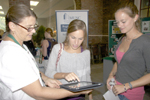|
|
|

|
MUSC pledges to be more energy efficient
|
MUSC and
other state institutions are major consumers of energy and natural
resources.
It is the university’s responsibility to be resourceful and follow
sustainable practices according Caroline Davila of Engineering and
Facilities. To do this, MUSC is committed to conserving natural
resources by reducing the use of non-renewable resources and increasing
energy efficiency.
 Caroline Davila
assists College of Graduate Studies students Amy Young and
Raquela Thomas in signing the MUSC Student Sustainability Pledge
Aug. 23. Students can sign the digital pledge at http://tinyurl.com/349dcef. Caroline Davila
assists College of Graduate Studies students Amy Young and
Raquela Thomas in signing the MUSC Student Sustainability Pledge
Aug. 23. Students can sign the digital pledge at http://tinyurl.com/349dcef.
In the coming months, MUSC will adopt economic practices in the areas
of event planning, alternative transportation, recycling and disposal
programs, energy and water conservation, purchasing and other areas.
This commitment is part of a collaborative effort led by MUSC’s
Division of Education and Student Life and supported by campuswide
departments, offices, colleges, student groups, employees and visitors.
“MUSC is committed to creating a sustainable educational environment
and the Sustainability Guidelines were developed to raise awareness of
how each student contributes to MUSC’s carbon footprint, as well as to
educate students on how we can increase our efforts to conserve
resources,” said Erin Pardue, MUSC Student Government Association vice
president.
In helping to meet MUSC’s potential, students are encouraged to take an
MUSC Sustainability Pledge, which commits them to support efforts
adopted for sustainability within the MUSC community.
Student
guidelines for sustainability
As one of the signatories of the American College and University
Presidents’ Climate Commitment, MUSC recognizes the importance of
promoting sustainability of the environment. It is the ultimate goal of
MUSC to utilize natural resources to meet our current needs while
protecting and conserving these resources to meet the needs of future
generations.
Students, as members of the MUSC community, can collectively make a
significant difference in the utilization of natural resources; and, it
is MUSC's intent to reaffirm the institution's commitment to
sustainability by presenting the following guidelines to assist
students in identifying ways they can contribute in a positive way to
the future environment of MUSC and on a larger scale, the world:
- Reduce the
environmental impact of MUSC events by assessing the impact of the
event and by following the MUSC Sustainability Event Guidelines (e.g.,
coordinating with a local food bank to donate left-over food, utilizing
biodegradable containers and paperless advertising);
- Identify and
utilize alternative transportation (e.g., bicycles, mass transit
systems);
- Recycle and buy
recycled products;
- Reuse by-products
and minimize what is discarded;
- Dispose of toxic
wastes (e.g., batteries, motor oil) according to the EPA
recommendations to minimize negative environmental impact;
- Support local
markets to avoid transportation over long distances;
- Purchase energy
efficient products (e.g., Energy Star appliances, computers, home
improvements);
- Consider the
impact of purchasing imported items (e.g., environmental impact on the
ecosystem in the country of origin);
- Conserve resources
(e.g., turning off lights and computers when not in use);
- Print only when
necessary and print double-sided using vegetable-based ink;
- Consider taking
the MUSC Sustainability Pledge;
- Consider joining
the Environment & Community Sustainability Committee;
- Participate in
MUSC Sustainability Events; and,
- Find creative,
sustainable solutions to meet needs and wants.
MUSC faculty and
staff support students in their efforts to meet the above
guidelines. It is important to recognize that these efforts are
not intended to decrease the quality or quantity of students’
educational experiences, but rather to provide a healthier educational
environment.
By embracing these guidelines, MUSC will continue in a leadership role,
setting an example for other universities, and our state and local
communities to emulate.
Friday, Sept. 3, 2010
|
|
|



